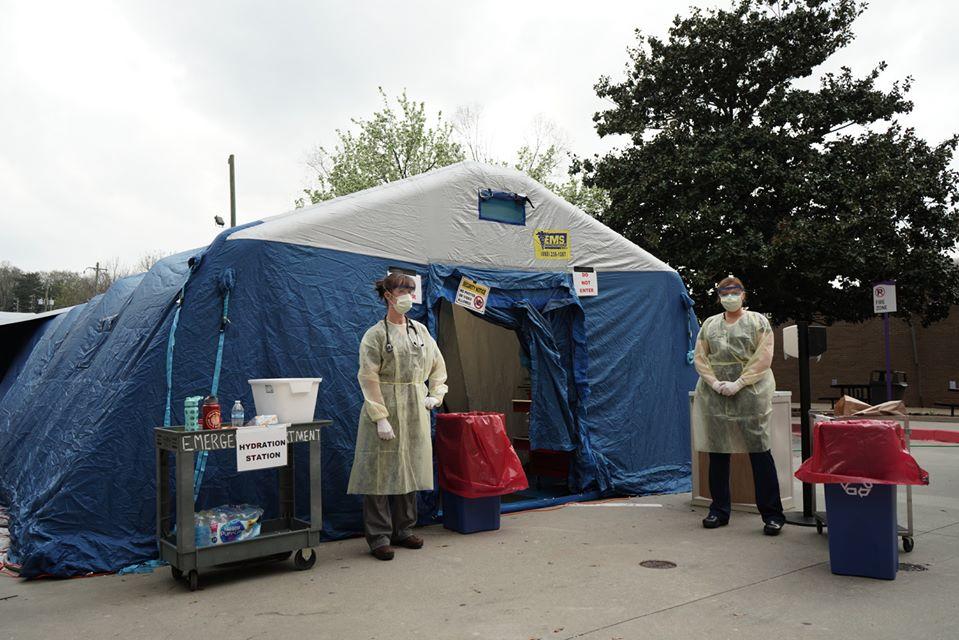Section Branding
Header Content
How To Guard Against Coronavirus Scams, Misinformation And Price Gouging
Primary Content
The attorney general’s office is warning Georgians to watch out for scammers and misinformation surrounding coronavirus and announced a new partnership to combat price gouging of essential supplies.
Attorney General Chris Carr said Tuesday his office is working with companies like Amazon, eBay, Walmart and Facebook directly to tackle complaints about sellers overcharging for goods or scammers taking advantage of consumers.
Speaking via Skype, Carr said there are a number of ways Georgians can protect themselves from rumors and scammers.
The AG’s office is providing legal guidance to state agencies, serves on the state coronavirus task force and acts as the primary consumer protection agency, fighting scams and price gouging.
“Unfortunately, you’ve got folks that will take advantage of any situation to take advantage of, steal money from, and steal information from those that are vulnerable,” Carr said.
What types of scams have been cropping up so far?
One of the most prevalent things Carr has seen reported to his office so far has been claims of access to coronavirus treatment or a vaccine, through an email or text or on social media.
“There isn't one available,” Carr said. “So anybody that's telling you that you can click on this link or call this number to get access to a treatment or to a vaccine… Now they're trying to scam you.”
The same goes for people trying to sell products that claim to protect you from getting COVID-19.
“The best thing people can do as it relates to treatments or health care is go to the CDC, go to the Department of Public Health, or to coronavirus.gov,” he said. “But go to a trusted source to get that type of information.”
Another popular scam relates to monetary relief coming from the federal government. While Congress is working on a package that would send checks to many Americans, Carr said that would be done from an official source and not through an email, text message or social media post.
“The government will reach out to you,” Carr said. “And usually, it is by mail. So as we try to remind folks, you are in control of the transaction. You reach out, you find out the website, you make the phone call, you send the e-mail and make sure that you are in control before you give up any data.”
Misinformation about state and local restrictions on public gatherings
Georgia is not currently under any sort of statewide “stay at home” order for all residents, though bars are closed and those deemed "medically fragile" must stay inside for two weeks. Some counties and cities have ordered such restrictions.
To find out what the state is doing, Carr said Georgians should check the governor’s website, where any executive orders are posted, and the same thing is true for your city or county’s website and social media.
Carr said there is a good rule of thumb to protect your information and avoid being taken advantage of: don’t trust anything that is sent to you that you didn’t ask for.
“If you didn’t ask to receive a text or an email or even have someone come to your door… be very wary,” he said. “You be in control of that transaction and shut the door, close out the email and delete the text.”
Social distancing doesn’t mean distancing from open meetings laws
As local governments begin to grapple with digital meetings and decision-making, Carr said it is important to keep transparency and accessibility front and centers.
“There is actually in the Open Meetings Act a provision dealing with emergencies, and allowing for there to be teleconference calls used,” he said. “But we want to make sure also that there is a way for the public to listen in and to have their voice heard.”
His office is working with the Georgia Municipal Association and the Association of County Commissioners of Georgia to educate them on ways to hold virtual meetings that are still open to the public, and also urges anyone with questions to reach out and ask.
Working with businesses to combat price gouging
So far, there have been about 200 complaints of price gouging received by the Consumer Protection Division for things like food, toilet paper, water and hand sanitizer.
“If you've taken something that used to be 50 cents and now it’s $50, that's gonna be problematic,” he said. “You can't charge more for a particular good that has to do with public health, safety and well-being.”
If someone is found guilty of price gouging, the fine can be up to $15,000.
Carr announced a new partnership Tuesday that opens a direct line of communication with several businesses and members of the private sector to quickly identify potential violations and address them.
What do I do if I see a scam, someone overcharging or spreading misinformation?
“Call out the bad information and go to websites that are legitimate,” Carr said. “Encourage people to go to those places and get the accurate information out there.”
For health care information, that includes the CDC and the Georgia Department of Public Health.
For consumer goods and products, people can visit consumer.ga.gov.
If it has to do with official responses to coronavirus, the governor’s website will have updated information, as well as city or county website and your local news organizations.


